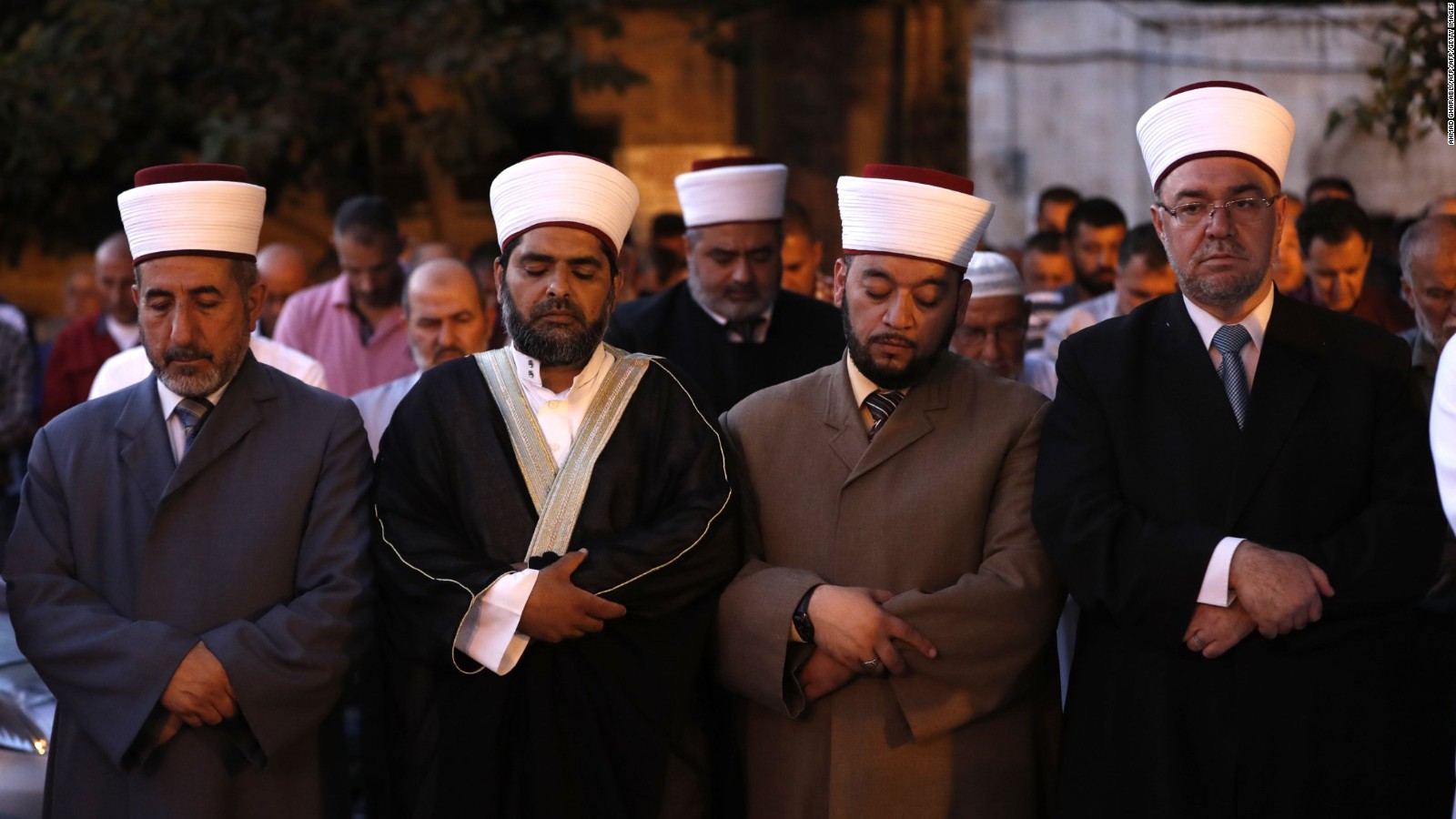The
worshippers returned for midday prayers for the first time in nearly
two weeks after Israel removed controversial security measures from the
entrance to the holy site, known to Muslims as the Noble Sanctuary and
Jews as the Temple Mount.
The
decision to pray inside -- instead of outside the site in protest --
followed a recommendation from Palestinian President Mahmoud Abbas and
the Muslim leaders of Jerusalem.
Many
worshippers entered in an organized fashion but occasional scuffles
erupted. Israeli police threw stun grenades and smoke grenades to
disperse the crowds; Muslim worshippers hurled water bottles and stones
in response.
Thousands responded to the calls of Muslim religious leaders to attend
afternoon prayers on Thursday. Amid the crowds, there was a visible
Israeli security presence.
Earlier, the Grand Mufti of Jerusalem
and the Imam of al-Aqsa Mosque said they were satisfied with Israel's
removal of metal detectors and other security measures opposed by
Muslims.
Muslim religious leaders had called upon worshippers to enter through all gates collectively for afternoon prayers on Thursday.
They also called for all mosques in the area to shut down on Friday and direct worshippers to the al-Aqsa Mosque instead.
The
announcement came after Israeli police said cameras that were installed
at the site have been taken down, two days after metal detectors were
also dismantled.

Sheikh
Omar Kiswani(second from left), al-Aqsa director, and other clergymen
join as Palestinian Muslim worshippers pray outside Jerusalem's Old
City.
Israel installed metal detectors and security cameras close to the entrance to the sacred site after an attack in which two Israeli police officers were killed.
The
Jordanian Authority in charge of the site, the Islamic Waqf, encouraged
worshippers to return to prayers Thursday morning inside the compound.
Waqf
leaders had not entered al-Aqsa to pray after Israel's decision to
install new security measures, and many Muslims follow the lead of the
Waqf.
Previous declarations from political and
religious leaders had increased the likelihood of widespread
demonstrations in and around Jerusalem following Friday's midday Muslim
prayers. The demonstrations often turned into clashes between
Palestinian protestors and Israeli soldiers, fueling a wave of unrest.
In a series of tweets on Thursday,
Jordan's King Abdullah II stressed the importance of ensuring "respect
of historical and legal status quo at Al Haram Al Sharif to prevent
repeat of crisis" and warned that Israel's response to a shooting at the Israeli Embassy in Amman this week and other incidents "will have direct impact on our relations."
The
King also posted Tweets accusing Israeli Prime Minister Benjamin
Netanyahu of "political showmanship" and "provocative" conduct that
threatened regional security and fueled extremism.
The security measures are now the same
as they were before the July 14 attack at the site, though police are
preparing for more confrontations. Netanyahu announced that there would
be a greater security presence in the Old City on Friday, with more
border police officers at the flashpoints.
"Overnight,
throughout the evening, yesterday all the remaining structures and
cameras were removed from the area, which were set up after the
terrorist attack," Israeli police told CNN.
"At
the moment that's the situation on the ground. Police are in and around
different areas in the Old City. We are making security assessments
leading up to Friday prayers."
Netanyahu threat
Meanwhile,
Netanyahu threatened to close Al Jazeera's office in Jerusalem,
according to a statement posted on his official Facebook page.
Netanyahu accused the news network of fomenting violence around the Jerusalem security saga.
"I turned to law enforcement multiple times demanding that they close the Al Jazeera office in Jerusalem," Netanyahu wrote in the post late Thursday. "If this does not happen through legal means, I will act by the necessary means to remove Al Jazeera from Israel."
In his attempt to ban the Qatar-based network, Netanyahu is perhaps taking his lead from an unlikely source.
Saudi Arabia, the United Arab Emirates, Bahrain and Egypt have told Qatar to shut down the Al Jazeera network
and its affiliates, as part of a list of demands that the Arab states
have handed to Qatar as the diplomatic crisis in the Gulf continues.
Saudi
Arabia and Jordan have closed down Al Jazeera offices amid the regional
spat. The Egyptian Al Jazeera office shut down in 2013.
Saudi Arabia, the United Arab Emirates, Bahrain and Egypt have told Qatar to shut down the Al Jazeera network
and its affiliates, as part of a list of demands that the Arab states
have handed to Qatar as the diplomatic crisis in the Gulf continues.
Saudi
Arabia and Jordan have closed down Al Jazeera offices amid the regional
spat. The Egyptian Al Jazeera office shut down in 2013.
0 comments: